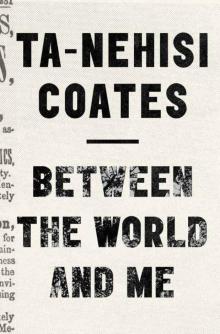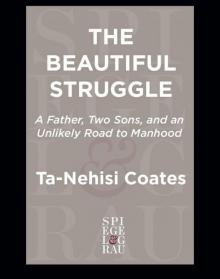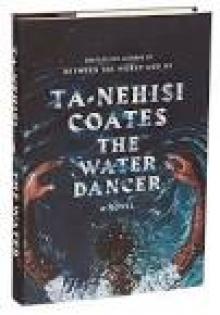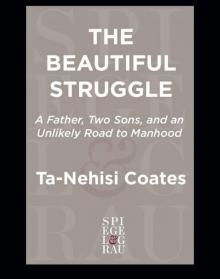- Home
- Ta-Nehisi Coates
The Water Dancer (Oprah's Book Club) Page 20
The Water Dancer (Oprah's Book Club) Read online
Page 20
I opened the paper. I brought the gingerbread to my mouth, and as I ate, something inside me cracked open, unbidden. The path I’d seen back at Mars’s bakery, the one called up by that scent of ginger, now appeared before me again and this time there was no fog, and really there was no path, just a place. A kitchen, which I instantly recognized as belonging to Lockless. And I was no longer on the bench, or even near the promenade. I was standing in that kitchen, and I saw on the counter cookies, pastries, and all manner of sweet things, on trays lined with parchment paper, just as they had been back at Mars’s bakery. And there was another counter adjacent to that one, and I saw behind it a colored woman, singing softly to herself, kneading dough, and when she saw me she smiled and said, “Why you always so quiet, Hi?”
Then she went back to kneading and singing to herself. Some time passed before she looked up at me again and laughed. “I see you there eying Master Howell’s ginger snaps,” she said. “You might be quiet but you fixing to get me in a whole mess of trouble.”
She shook her head and laughed to herself. But a few moments later, I saw a look of caution on her face as she brought an extended index finger to her closed lips. She walked over to the door and peeked out, then walked back over to the other counter, filled with treats, and pried two ginger snaps loose from the paper.
“Family got to watch for each other,” she said, offering these to me. “And furthermost, as I see it, all of this belong to you anyway.”
I took the two cookies from her hands. I must have known what was happening. I must have realized, amidst it all, that wherever I then was, it was not the Lockless of now, was perhaps not even the Lockless of then. It was as though I were in a dream. And this woman before me, I could not name her, though I felt a pang of recognition, and a pang of something more—of loss. And so strong was this feeling that I ran to her, the ginger snaps still in my left hand, and hugged her, long and hard. And when I stepped away, she was smiling big as day, big as the baker Mars had smiled at me only that morning.
“Don’t forget,” she said. “Family.”
And then I saw the fog return, float into the kitchen from all around, until the counter disappeared before me, and the trays disappeared before me, and the woman disappeared before me, and she said to me as she faded from my sight, “Now get on.”
And then I was back, seated on a bench. I felt tired. I looked at my hands, which were now empty. I looked up and out past the promenade to the river. The man on the unicycle rode past again. He waved. I looked to the benches to my left and then my right. The line of benches continued on both sides with little difference, save this—three seats down I saw a piece of half-eaten gingerbread on the bench, and in the grass the parchment in which it had been wrapped, blowing gently in the summer breeze.
16
NOW I KNEW. THAT was Conduction. The power was still with me, even if I did not quite understand how to call it forth. I dragged myself, exhausted, back to our building and fell asleep as soon as I returned to my room, with the sun still out, and did not wake again until early the next morning. I thought to try to access the power again, but the fatigue and malady that I now saw accompanied every Conduction dissuaded me. Instead, I decided to visit Mars’s bakery again and apologize for my rude manner. Then, perhaps, walk through the city more, to test the freedom, perhaps east this time toward the Delaware River, maybe even across it and into the small hamlet of Camden, where Raymond and his family lived. But just as I pulled on my brogans, I heard a knock at my bedroom door and then Otha’s voice.
“Hiram, you there?”
I opened my door and saw Otha already descending the staircase. He looked back up at me, still bounding down, and said, “Gotta go.”
I followed him down the steps and into the parlor, where we found Raymond pacing with a letter in hand. When he saw us, he walked to the door, grabbed his hat, and, without a word, dashed out. We followed him out onto Ninth Street and then to Bainbridge, which was already by then flush with the flow and miasma of Philadelphia.
“The law of our state is quite clear,” he said when we caught up to him. “No man or woman can be held under bondage—even if brought here under bondage. Haven, once requested, must be granted. But it must be requested. We cannot induce them to freedom. They cannot be wooed.”
“But the masters,” said Otha, looking at me. “They keep the law hidden. They tell their people lies, frighten ’em. Threaten their families and friends.”
“But when we have someone who clearly states their intentions,” said Raymond, “then we are empowered to make sure those intentions are respected. And this Bronson woman has made such a request—one that her captor dishonors. Forgive my rush, but time is short. If we are to make this man honor the law, it must be done right now.”
We were headed east now, along the same path I had thought to take earlier that morning. Before long we were at the docks, and I could see the Delaware lapping gently against the ships. It was now Saturday. Hot yet again, hotter in this city than anything I had ever known in Virginia. Shade had no meaning here. The heat followed you as sure as the odor, and the only relief I was coming to find was here at the shores of the city. We walked a few piers to the south until we stood before the gang-plank of a riverboat. We boarded quickly. Raymond surveyed the passengers but did not see anyone matching this Bronson woman he spoke of. Then a colored man said, “They down below, Mr. White.”
We walked to the back of the boat and found a set of stairs leading down, and there in the belly we saw another group of passengers. I recognized the “Bronson woman” before Raymond did. I needed no description. I had, in just my two days, seen my share of tasking folks. They were dressed as well as the free coloreds here, perhaps even better dressed, as though their captors sought to conceal the chain that extended between them. But if you watched long enough, you could see in their manner, in the particular way they attended, that some other power held them. And this Bronson woman was well-dressed, costumed even, the way Sophia would be costumed for Nathaniel, and I saw her arm was held tight by a tall thin white man, and that with her other hand she held tighter still to a boy no older than six. I watched her eyes spot Raymond, who was still searching, and then her eyes found mine, and then she looked away, turning her gaze to her son.
By then Raymond had caught on. He walked over and said, “Mary Bronson, I understand you have made a request. We are here to see this request done, in accordance with the law of our state, which shows neither respect”—and now Raymond fixed his eyes on the tall thin man—“nor regard for the customs of bondage.”
I was out of Virginia, cut from a world where our work was furtive, where I was a criminal who must respect the very customs I was working to destroy. But here I was in Philadelphia, watching an agent of the Underground operate in the wide open, with no choreography, no costume. Raymond’s words went off like a bomb. And the white man who held Mary Bronson felt it.
“Damn you,” said the white man, yanking at Mary Bronson’s hand, so that she stumbled off-balance a bit. “I mean to return with my property to my home country.”
Raymond ignored him.
“You are under no order to obey,” he said to Mary. “He will not detain you while I stand, and should you come with me, I assure you the law of this state will reinforce my efforts.”
“Damn you, I have her!” said the man. This he said with great force. But I saw he no longer held Mary’s arm. I did not know if she had slipped it free or if he, with his wrath focused on Raymond, had simply forgotten. By now a small crowd had gathered near us, some to reinforce, some to see the source of the commotion. They informed each other of the details of the story. They grumbled and motioned toward the man, who did not seem to perceive what little power he had withering around him. But Mary perceived it all. The crowd buoyed her. She took the hand of her child, and walked toward Raymond. The man fumed, called for Mary to return, but she ignored
him, positioning herself behind Raymond, and the child behind her.
“Boy,” the man said, his eyes raging at Raymond. “If I were home I’d have you in your proper place, and break you good.” At this the grumbles grew into taunts, shouts, and threats.
There is a moment in the stormy lives of a few blessed colored people, a moment of revelation, when the sky opens up, the clouds part, and a streak of sun cuts through, conveying some infinite wisdom from above, and this moment comes not from Christian religion, but from the sight of a colored man addressing a white one as Raymond White now did as he turned to the white man.
“But you are not home.”
Then he looked back at the crowd, and the man following with his eyes began to understand his predicament. Rage and determination fled from him. Fear and panic closed in. The thin white man seemed to grow paler and thinner by the second. The crowd, agitated by the man’s threats, now murmured to each other as to what they ought to do next.
* * *
—
After we watched the boat shove off, Otha and I sat with Mary Bronson and her son back at the Ninth Street house. Raymond had gone off to begin the business of having Mary housed and, hopefully soon, employed. It was the custom in Philadelphia to take an account of the ordeal of all who passed through the Philadelphia station. It was yet another notion that was utterly unimaginable in Virginia, where such accounts might implicate a fugitive. But Raymond believed himself in the midst of history and felt strongly that all pertaining events should be well recorded.
Otha made coffee and gave Mary’s son a collection of toys—cows, horses, and other farm animals rendered from wood. I took the moment to walk over to Mars’s bakery, where he introduced me to his wife, Hannah. I managed a smile upon meeting her and did my best to apologize for my demeanor the day before. He handed me two loaves of warm bread and said, “Nothing to apologize for. Like I said, family.”
Back in the house, Mary was on the floor of the parlor playing with her son. I went to the kitchen with the bread, searched for a knife, a platter, and plates. There was a jar of preserves on the counter along with a wedge of cheese. With all of this I fashioned a spread and placed it upon the dining room table. Otha served up the coffee for everyone and brought Mary and her son to the table. There was a gentle air of relief and even celebration in the meal.
After the meal, Mary helped us clean up. Then we repaired to the living room for the interview. I watched as Mary’s son took a wooden soldier in each hand, made a threatening face, and then crashed the two horses into each other with a loud “Pssshhh!”
“What is his name?” I asked.
“Octavius,” she said. “Don’t ask me why, I ain’t name him. Ol massa decided that like he decided everything else.”
Otha offered Mary a seat on the sofa. I went up to my room and retrieved paper and two pencils. Then I sat down at the table. Otha was to ask the questions. I would record.
“My name is Mary Bronson,” she told Otha. “And I was born a slave.”
“No more, though,” Otha said.
“No more,” Mary repeated. “And I want to thank y’all for that. You got no idea what I been through down there, what we all been through. I’d have done anything to get out from under that man, I just wasn’t sure how. You know this ain’t even the first time I been to the city, and it ain’t even the first time I had the notion to run. I don’t know why I ain’t done it before.”
“Where you from, Mary?” Otha asked.
“Hell,” she said. “I am straight out of hell, Mr. Otha.”
“And why you say that?” Otha asked.
“I had two other boys, beside Octavius here, two other boys and a husband. He was a cook just like me. Everybody around the house loved the work I did.”
“Did you love your own work?”
“Was never my work to love. But I was different, you see. Fact of it is, I had an understanding with my old master. I did the cooking, but I wasn’t the only one in the kitchen. So time to time, my old master would hire me out and split whatever I made with me. Plan was to gather up enough to buy me and mine out. I would go first, so as not to have to split nothing no longer, and then I’d get my man, Fred, that was my husband’s name, I’d get him so as to have another hand to work. And then we’d, all together, get the young’uns.”
“And what happened?”
“Old master died. Place was carved up and one of them low whites—man you just seen—took over. Then I ain’t like my work so much. He took all the money for himself, said he had no notion for any agreement with my old master, nor any banking. So I got crafty. Started working slow and sloppy. But he caught on.”
Mary Bronson paused here. She drew herself in, composed herself to continue.
“That’s when the beating start. He set a figure for every week. Said if I ain’t make that figure he’d take it out on my hide. He threatened to sell my husband, my sons—all my boys. I worked hard as I could, Mr. Otha. He sold them anyway. He spared me my youngest”—she nodded to the little boy, still on the floor playing with the wooden animals—“but that wasn’t no sympathy or concern. It was weight. He held that boy over me, so I always had something else to lose.”
“Why’d he bring you to the city?” Otha asked.
“He got family up here,” she said. “He was bragging to them about my work. Had me working for his sister. In his sister kitchen.”
“Up here?”
“Yes, he did. But I done showed him, have I not?”
“Surely, you have.”
“Chain is a powerful thing, Mr. Otha, a powerful, powerful thing. I was thinking bout all the times I come north and ain’t run. And I was thinking about the grip they got on me. And I knew that boy would be off to the fields in a year or so, and I knew that then they’d have him too.”
She sobbed softly into her hands. Otha went over and sat next to Mary Bronson. Then he drew her close, held her, gently patting her back. As he held her, Mary Bronson wailed and I heard in the wailing a song for her husband, her boys, and all her lost.
I had never seen an agent do what Otha was now doing—comforting her, treating her with the dignity of a free woman, not an escaped slave. He rocked her in his arms until she was settled and then he stood and said, “We shall have a place for you and your boy in the next few days. Raymond gone to get all that started. You and your son welcome to stay here until it’s all arranged.”
Mary Bronson nodded.
“It’s a good city, ma’am,” said Otha. “And we are strong here. But I understand if you don’t want to stay. Either way, we gon help how we can. As you will soon see, finding freedom is only the first part. Living free is a whole other.”
There was a moment of silence. I had stopped writing, thinking the interview terminated. Mary Bronson had stopped crying now. She wiped her face with Otha’s handkerchief. And then she looked up and said, “Ain’t no living free, less I’m living with my boys.”
She had composed herself now. I could see that her pain and fear were shifting into something else. “I don’t wanna hear about your church. Don’t wanna hear bout your city. My boys—they the only city I need. Now you done found a way to get me and Octavius out, and by God, I am thankful for it. I was raised correct—I am thankful. But my other boys, all my lost boys, that is my highest concern.”
“Mrs. Bronson,” said Otha. “We just ain’t set up like that. That just ain’t in our power.”
“Then you ain’t got the power of freedom,” she said. “If you can’t keep them from parting a mother from her son, a husband from his natural wife, then you got nothing. That boy over there is my everything. I run for him, so he might know some other world. Left on my own, I would have died as I was born—a slave. That boy freed me, you see. And I owe him so much. Mostly I owe him his pappy and his brothers. If you can’t stop them from breaking us up, as they do
, if you can’t put us back together, then your freedom is thin and your church and your city hold nothing for me.”
* * *
—
That following Monday I began my employment in a woodworking shop, just off the Schuylkill docks, at the corner of Twenty-third and Locust. The owner was an associate of Raymond White’s, and a large number of those who labored there were fugitives. I worked there three days a week and three for the Underground.
After work I would usually walk alone through the city, taking in the incredible alchemy of sounds, odors, and sensations, all of which proceeded late into the night. But still and all, among that incredible amalgam of people, I somehow felt alone. It was Mary Bronson who’d done it, her longing, her hunger for a freedom that extended to all of her blood. For what did it mean to be free, in a city such as this, when those you hold to most are still Tasked? What was I without Sophia, without my mother, without Thena? Thena. Boy like you should be more careful with his words, she said. Never know when they the last ones he might put upon a person. And I should have been, I knew that even then. But I was now aging faster than my years, so that Thena’s words redounded with the lamenting of a man much older than my twenty years. My treatment of her was the worst thing I’d done in my short life. I saw now that I had been little more than a boy lusting after a dream. And now the dream was gone, like Mary Bronson’s boys were gone, carried off into the deep, far from any means the Underground might muster to recover it.
One Friday morning, as I was leaving for work, Otha approached me and said, “A man can’t be too long without family.”
I stared back and said nothing.
He smiled. “Still, it might be nice to be with some folks who care, Hiram. Supper? Tonight? At my momma’s. What do you say? Whole family’ll be there. We good folks, I tell you, and would very much welcome you as our own.”

 Between the World and Me
Between the World and Me The Water Dancer (Oprah's Book Club)
The Water Dancer (Oprah's Book Club) Beautiful Struggle
Beautiful Struggle The Water Dancer
The Water Dancer The Beautiful Struggle
The Beautiful Struggle